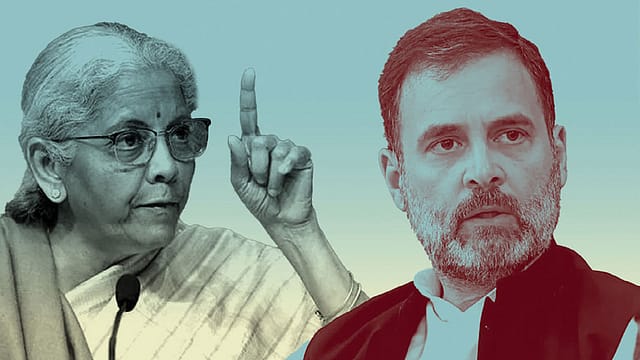A Selective Memory on GST

Finance Minister Nirmala Sitharaman refuted Congress’ charge that changes in the Goods and Services Tax (GST) were “course corrections” to iron out infirmities that the party claimed to have pointed out. “We were the ones to bring in GST, they could not even attempt it. If the implication is that we brought it wrongly, I am sorry… Gradually, the rates are coming down, so the correction is for the sake of people getting benefits because once the collections increase and the tax net widens, you are able to give the benefits back. Whoever speaks on behalf of Congress should have a former finance minister beside them to educate them,” Sitharaman told the media.
Despite states with Congress governments being represented in the GST Council, the party has consistently attacked GST as “Gabbar Singh Tax”. Public memory is short, but Congress delayed passage of the GST legislation by two years till 2017 by insisting on conditions like a maximum 18 per cent tax rate be written into the Bill despite the impracticability of doing so as some luxury products needed a much higher slab. Further, the need to get parliamentary approval for changes in the maximum slab would hamper the functioning of the GST Council. Congress leader Rahul Gandhi believed hurting the new Modi government’s “feel-good” factor would benefit his party. Congress therefore used BJP’s lack of numbers in Rajya Sabha to block the constitutional amendment and relented only in the face of adverse feedback that it was being perceived negatively as obstructionist by opposing a measure that would benefit consumers as well as business.
Openomics 2026: Continuity and Conviction
06 Feb 2026 - Vol 04 | Issue 57
The performance state at its peak
Nervous About MNS
There are mixed feelings in Congress about Raj Thackeray’s Maharashtra Navnirman Sena (MNS) being a part of Opposition protests against the Election Commission over alleged—and so far unsubstantiated accusations—illegal additions to the voter list. MNS does have a distinctive identity and its past actions are a cause for unease within Congress. State party chief Harshwardhan Sakpal said any additions to the Maharashtra Vikas Aghadi (MVA) need approval. “If any new alliance partner is to be added to the political equation in Maharashtra, all the I.N.D.I.A. bloc parties will have to sit together,” Sakpal told The Hindu. There is concern MNS could alienate voters who have been at its receiving end.
Did the Lights Go Out?
While the Bihar election campaign is underway, political activity is picking up in neighbouring Uttar Pradesh. SP leader Akhilesh Yadav declared a government headed by him would ensure Christmas-type celebrations by keeping Deepavali Deepotsav celebrations in Ayodhya going for weeks. The remarks drew a sharp reaction from BJP that the SP chief was running down “sanatani” beliefs. The skirmish is only the latest with elections due in February 2027. The BJP government is complementing initiatives like Deepavali in Ayodhya with a strong promotion of women-friendly schemes.
Neighbour’s Envy
Karnataka IT minister Priyank Kharge’s bid to rake up a controversy on officials attending RSS programmes does not seem to be working. Reports of government staff joining the RSS centenary celebrations indicates Kharge is not being taken seriously. It is possible that many see the anti-RSS comments as an effort to divert attention from tough questions on Bengaluru’s poor infrastructure and the success of neighbouring Andhra Pradesh in stealing a march by bagging Google’s planned $15 billion AI hub in Visakhapatnam.
Concentrating on Essentials
Going by the discussions US Ambassador-designate Sergio Gor had with Prime Minister Narendra Modi recently, his arrival in New Delhi in the next year can improve communication with the White House significantly. Gor’s access to Donald Trump could mean miscommunication—that has marred India-US ties—will decline and the two sides will be able to concentrate on the essentials of their relationship. Despite his fixation with tariffs and the Peace Nobel, Trump is aware of the benefits of a stable relationship with India.
Billing Hazards
The recent tragic death of a woman Canadian paraglider, Megan Roberts, at Bir-Billing in Himachal Pradesh has raised serious questions about safety protocols and rescue capabilities at the popular adventure sport venue. The Canadian took off on October 18 and crashed about 40km away and sent an emergency signal. Rescuers were able to reach her only on October 20 by which time she was dead, reportedly due to head injuries. Rescuers had difficulty reaching the crash site at 13,000 feet. Enforcement of rules remains a challenge and compulsory use of GPS devices for paragliders needs to be considered. There have been a dozen deaths at Billing in the last five years.
Fog of Propaganda
The post-Diwali news was predictably full of higher pollution levels recorded and almost completely blanked out the sense of festivity in the Delhi-NCR region. Residents of urban villages began the day by carrying offerings to local temples. Women in bright dresses and children thronged temples and crackers lit up the night skies by bursting into vivid, colourful patterns. The average AQI was just 11 higher than last year when crackers were banned, but that did not distract so-called experts and commentators from criticising the Supreme Court’s decision to permit green fireworks for higher pollution.
